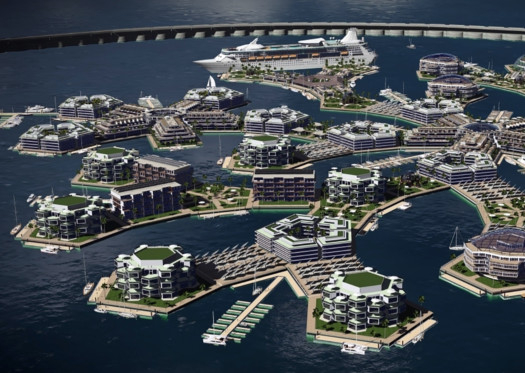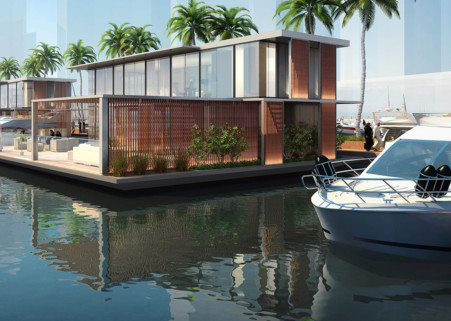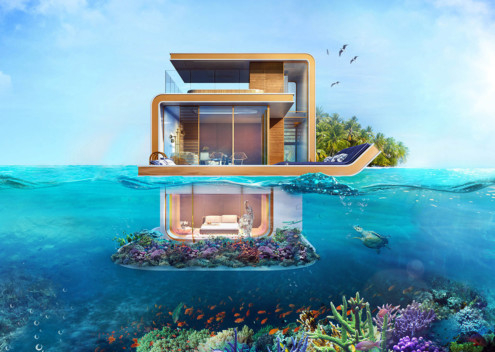
How far can the floating homes concept go? In Dubai, as a number of floating real estate projects have been announced, including luxury residences, some experts believe these could lay the groundwork for more elaborate large-scale developments, such as floating free zones and communities.
One of the first floating projects to be introduced in Dubai was a collaboration between Netherlands-based Dutch Docklands and Oqyana Real Estate. In January 2015, the partners announced that they will develop Oqyana Water First, which consists of 33 private villas on artificial islands, each with its own beach, garden and pool, at the Australasian cluster of The World islands. However, despite getting the go-ahead from The World developer Nakheel, the project has yet to commence groundwork.
Another project is the Floating Seahorse, which comprises floating luxury villas developed by the Kleindienst Group at The Heart of Europe cluster of The World. Last year, Dubai Properties also announced it will build 10 residential units, two restaurants and a yacht club, which will all float on the Dubai Water Canal.
Part of the Marasi Business Bay development, the floating homes will be the UAE’s first to have pedestrian and boat access. Dubai Properties has commissioned Finnish firm Admares to design, manage and manufacture the floating structures in a purpose-built manufacturing facility in Finland, which started production in October.
According to Dubai Properties Group CEO Abdullah M. Lahej, the Finns were chosen owing to their “use of innovative technologies and unique construction techniques to deliver this type of pioneering structures”.
He said the collaboration will ensure the project, which includes a promenade, parks and marina, will be “one of the most sought-after residential destinations in the city”. He also expects the homes to deliver “exceptional lifestyles, value and a lasting impact for the betterment of Dubai”.
Visible demand
Kleindienst Group had the first delivery of the Floating Seahorses in December 2015. Since then, it successfully sold out phase one and two in just eight months. Phase two included The Signature Villa series of 40 Emirati-inspired villas consisting of three levels — the main floor at sea level, an upper deck and a lower level completely submerged in water.
The main floor includes an outdoor shower, a kitchenette and a glass-bottomed jacuzzi, while the top floor contains a “sky majlis” and a “sky bedroom”. The lower, underwater level houses a master bedroom and bathroom with floor-to-ceiling windows offering full views on marine life.
Priced at around $3.3 million (Dh12.12 million) apiece, the floating luxury structures should make for “an idyllic and exclusive holiday retreat for UAE residents and international tourists,” says Josef Kleindienst, CEO of Kleindienst Group. He adds that the project is not confined to Dubai only. “Since the launch, we received many local, regional and international enquiries. The Floating Seahorse is not restricted to Dubai and can be designed and fabricated for other resorts and destinations worldwide,” says Kleindienst.
The floating villas are designed and developed by European architects for Kleindienst Group, in partnership with Greek aluminium specialist firm Alumil SA. They are technically boats without propulsion in a lightweight aluminium structure.
Floating free zones
The floating property concept could be extended to include entire communities, according to Simon Nummy, a Dubai-based architect and designer with Atkins and a consultant for The Seasteading Institute, a non-profit think tank experimenting with floating structures. He says the technology could be used to build floating artificial beaches, waterfront boulevards, cruise terminal, car parks and even affordable housing.
Nummy says an entire free zone can also be built using the concept. He has been working with The Seasteading Institute on the free zone concept for French Polynesia and signed a memorandum of understanding in January to develop a floating free zone off Tahiti.
Boosting the economy
The free zone — tax free industrial zones with their own regulatory framework — is a project aimed at boosting the economy of land-scarce French Polynesia, while being a first step to building autonomous floating cities around the world, says Joe Quirk, a spokesperson of The Seasteading Institute and author of the much-discussed recently released book How Floating Nations Will Restore the Environment, Enrich the Poor, Cure the Sick, and Liberate Humanity from Politicians, which describes a utopia of independent “nano nations” floating in the sea.
Quirk is a strong proponent of bringing the concept to the UAE. “French Polynesia may be the place to build floating nano nations, but Dubai is the place that will understand it, because they are already pre-seasteading,” says Quirk.













